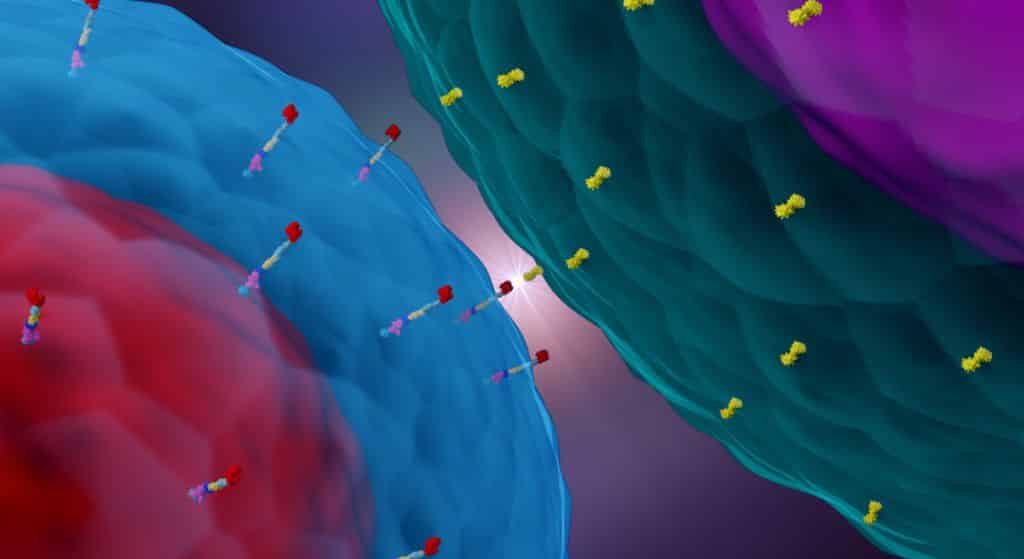A company developing precision T cell therapies that treat solid tumors announced yesterday (July 21) it is leading a consortium that has been awarded a €4 million ($4.2 million) grant from Horizon Europe.
The new consortium is being led by Achilles Therapeutics plc and includes CGT Catapult, Leibniz University Hannover (Hannover) as project coordinator, and the Fundacion para la Investigacion del Hospital Universitario la Fe de la Comunidad Valenciana (Valencia), toward the development of an innovative smart bioprocessing manufacturing platform (bioreactor) for personalized cell therapies.
Cell therapy
Edward Samuel, executive vice president at Achilles Therapeutics, said: “We are thrilled to be part of this consortium to support the continued innovation of cell therapy manufacturing processes. As a pioneer in the field of personalized cell therapies, we are excited to lend our expertise to this project which we believe can deliver significant benefits for patients.”
The consortium says that most cell therapy manufacturing platforms do not provide sufficient real-time data during production which can limit proactive decision making and reduce overall scalability. It says the consortium will collaborate on the development of a proof-of-concept, first-in-class, smart bioprocessing manufacturing platform for personalized cell therapies that aims to incorporate advanced inline spectroscopic sensors and smart machine-learning process control systems.
This project – Smart ManufactuRing for Autologous Cell ThERapies enabled by innovative biomonitoring technologies and advanced process control (SMARTER) – will advance the state-of-the-art in cell therapy manufacturing processes, by developing a first-in-class proof-of-concept “smart” bioprocessing manufacturing platform. The smart platform will be capable of analyzing key biomarkers in real-time and adjusting aspects of the process, accordingly, enabling the generation of drug product at a more consistent quality.
Horizon Europe
Of the €4 million that has been allocated to this project, approximately €1.4 million ($1.5 million) will be allocated to Achilles via the Horizon Europe Guarantee from UK Research and Innovation (UKRI).
CGT Catapult will receive €1.2 million ($1.2 million) and will use this amount to lead on the development of Raman soft sensors and chemometric models for on-line process biomarker monitoring. The company says the technologies will be developed using sophisticated and clinically relevant tumor neoantigen mechanistic models, which will be developed by Achilles and tech transferred into CGT Catapult.
Other members of the consortium will identify critical process parameters and biomarker monitoring targets (Valencia) and develop 2D fluorescence spectroscopy sensors (Hannover). The CGT Catapult will then finally use expertise in Process Analytical Technologies (PAT) and application of robotics and automation to bioprocessing systems to bring all this technology together and demonstrate a proof-of-concept device.
Important step
Matthew Durdy, CEO, of CGT Catapult, said: “At the heart of our vision for a thriving cell and gene therapy sector is our work to make the manufacture of ATMPs safer, more efficient, and more consistent. This project will be a hugely important step forward in this area, helping to improve scalability and reduce costs. We look forward to seeing how we can capture the lessons from this project and ensure that, in the long term, developers, clinicians and patients can benefit.”
Achilles Therapeutics will supply all biological material and cell models used during the project, with the new platform initially applied to tumor neoantigen samples and models supplied by the company (who are supplying all biological material and cell models).
Sascha Beutel, group leader at TCI, Leibniz University Hannover, added: “The SMARTER project will take advanced human T-cell manufacturing techniques a step further by improving the ability to monitor and control the process.
“As an academic partner with great expertise in online optical bioprocess monitoring, we are excited to be part of this project, which we believe will lead to an increase in knowledge and significant innovations in T-cell production – for the benefit of all patients in need of personalized T-cell therapy.”
Horizon Europe is the EU’s key funding program for research and innovation with a budget of €95.5 billion ($97 billion). It tackles climate change, helps to achieve the UN’s Sustainable Development Goals, and boosts the EU’s competitiveness and growth. The program facilitates collaboration and strengthens the impact of research and innovation in developing, supporting, and implementing EU policies while tackling global challenges.
Metabolomics
Agustín Lahoz, leader of biomarker and precision medicine at Hospital La Fe, said: “We are really excited to be part of the SMARTER consortium. This project will show the scientific community and society how metabolomics can be a valuable tool to find specific non-invasive biomarkers to monitor cells´ physiological status.
“This could be used to speed up the manufacturing procedure and to deliver better characterized cells to best match them with the adequate patients. This challenge is aligned with our commitment to developing new therapies to improve lung cancer treatment.”





